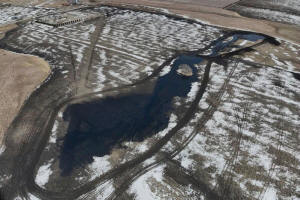Company says thousands of gallons of oil have been recovered from a
pipeline spill in North Dakota
[April 11, 2025]
By JACK DURA
BISMARCK, N.D. (AP) — Workers have recovered thousands of gallons of
crude oil from an underground pipeline spill on North Dakota farmland,
the owner of the line said Thursday, but it remains unclear when oil
will again start flowing to refineries.
South Bow is still investigating the cause of the spill Tuesday along
the Keystone Pipeline near Fort Ransom, North Dakota, about 60 miles (97
kilometers) southwest of Fargo, the company said.
The spill released an estimated 3,500 barrels, or 147,000 gallons of
oil, onto farmland. The company said 700 barrels, or 29,400 gallons,
have been recovered so far. More than 200 workers are on-site as part of
the cleanup and investigation.
South Bow has not set a timeline for restarting the 2,689-mile (4,327
kilometers) pipeline, which stretches from Alberta, Canada, to
refineries in Illinois, Oklahoma and Texas. The company said it “will
only resume service with regulator approvals.”
A map from the company shows the pipeline is shut down from Alberta,
Canada, to points in Illinois and a liquid tank terminal in Oklahoma.
The line is open between Oklahoma and points on Texas’ Gulf Coast,
according to the map.
South Bow is working with the federal Pipeline and Hazardous Materials
Safety Administration and the state Department of Environmental Quality.
Continuous monitoring of air quality hasn't indicated any adverse health
or public concerns, South Bow said.
The site remains busy, said Myron Hammer, a nearby landowner who farms
the land affected by the spill. Workers have been bringing in mats to
the field so equipment can access the site, and lots of equipment is
being assembled, he said.
The area has traffic checkpoints, and workers have been hauling gravel
to maintain the roads, Hammer said.
There is a cluster of homes in the area, and residents include retirees
and people who work in nearby towns, he said. But the spill site is not
in a heavily populated area, Hammer said.
[to top of second column]
|

This image provided by South Bow shows a spill from the Keystone oil
pipeline that occurred Tuesday, April 8, 2025 near Fort Ransom, N.D.
(South Bow via AP)
The pipeline shutdown means that refineries that rely on crude oil
will have 3% to 4% less of the total flows in a daily market of 17
million to 20 million barrels, said Ramanan Krishnamoorti, vice
president for energy and innovation at the University of Houston.
“It's hard to see how you replace that into the stockpile that goes
into these refineries,” he said. “Typically you have storage of
crude in storage tanks and ships and everything. That might be a few
days. But when you start to lose 3%, 4% of daily demand, it's going
to have impacts.”
Gas prices in the Midwest have already seen an increase that is
likely to grow, and diesel prices could be impacted significantly
and quickly, he said.
Mark LaCour, editor-in-chief of the Oil and Gas Global Network, said
he doesn’t think the pipeline shutdown will affect the middle of the
country dramatically. But if it stays down, in two or three weeks
there will be a significant price increase in the Midwest, he said.
Underground oil pipelines can be subject to a number of problems,
both internal and external, said Robert Hall, a senior technical
adviser with the Pipeline Safety Trust who was previously the
director of the Office of Railroad, Pipeline and Hazardous Materials
Investigations at the National Transportation Safety Board.
Pipelines can face internal factors such as corrosion and pressure
fluctuations. The latter can lead to fatigue and cracks, Hall said.
External threats include corrosion, dents, gouges and construction
damage, he said.
Pipelines are the safest method for transporting petroleum products,
Hall said.
“Just based on the accident history, if you look at the accidents
that have occurred with trains, trucks and barges, there are
collisions,” he said, citing a 2013 oil train derailment in Quebec
that killed 47 people.
All contents © copyright 2025 Associated Press. All rights reserved |